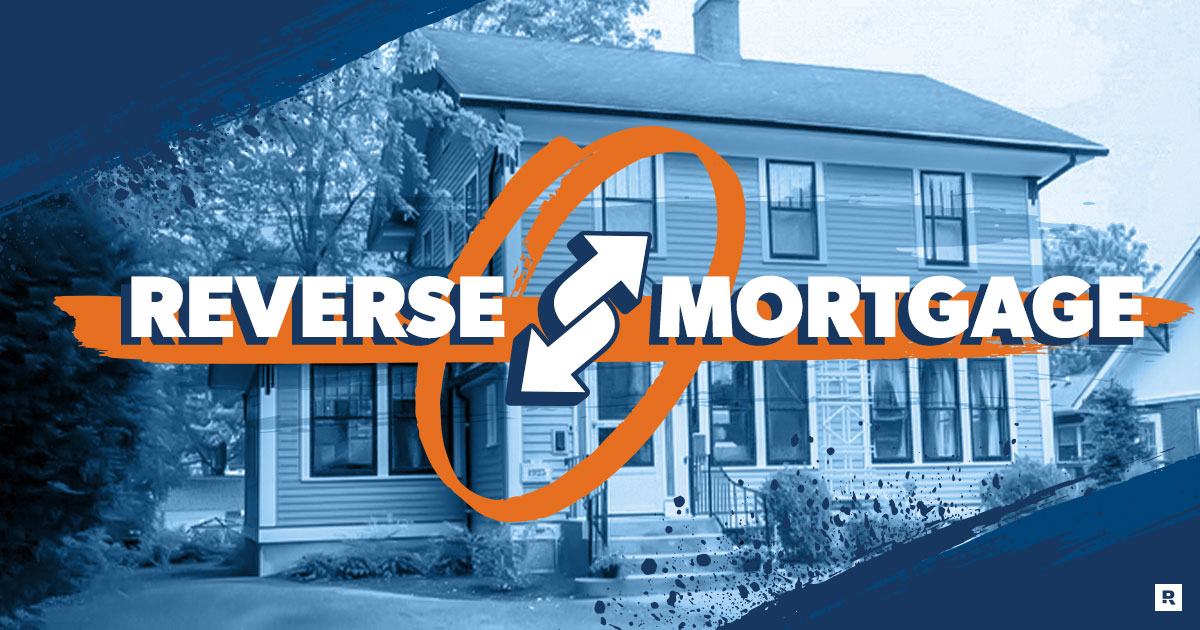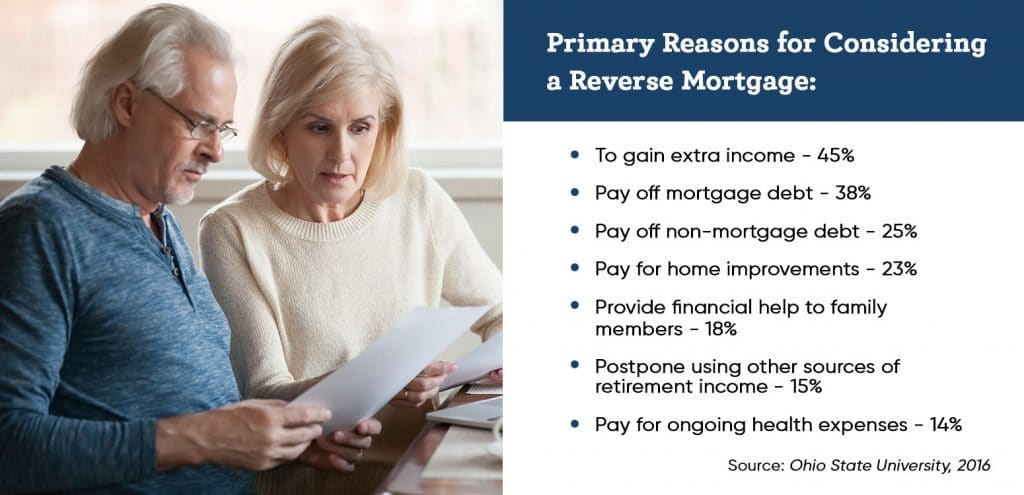Empower Your Retirement: The Smart Means to Purchase a Reverse Home Mortgage
As retirement approaches, several individuals seek reliable techniques to boost their monetary freedom and wellness. Amongst these techniques, a reverse home mortgage becomes a viable choice for property owners aged 62 and older, permitting them to take advantage of their home equity without the requirement of month-to-month payments. While this monetary device uses several benefits, consisting of enhanced cash money circulation and the potential to cover essential costs, it is essential to recognize the ins and outs of the application process and key factors to consider included. The following actions might expose how you can make a knowledgeable decision that can substantially affect your retirement years.
Recognizing Reverse Mortgages
Understanding reverse mortgages can be important for home owners looking for economic adaptability in retirement. A reverse mortgage is a financial product that enables qualified homeowners, typically aged 62 and older, to transform a part of their home equity right into cash money. Unlike standard mortgages, where consumers make monthly settlements to a lending institution, reverse home loans allow property owners to receive payments or a swelling amount while keeping ownership of their residential property.
The amount available via a reverse home mortgage depends upon several factors, consisting of the house owner's age, the home's value, and existing rate of interest. Notably, the financing does not have actually to be paid back till the house owner sells the home, vacates, or passes away.
It is important for possible customers to understand the ramifications of this financial item, including the effect on estate inheritance, tax factors to consider, and continuous responsibilities associated with home maintenance, taxes, and insurance policy. Furthermore, counseling sessions with certified experts are frequently called for to make certain that debtors fully understand the terms of the lending. Generally, a comprehensive understanding of reverse home mortgages can empower house owners to make informed decisions concerning their financial future in retired life.
Benefits of a Reverse Home Loan
A reverse mortgage provides numerous compelling advantages for qualified homeowners, especially those in retired life. This financial tool permits elders to transform a portion of their home equity into cash money, offering vital funds without the requirement for monthly mortgage repayments. The cash gotten can be made use of for various purposes, such as covering medical costs, making home enhancements, or supplementing retired life earnings, hence boosting total economic flexibility.
One significant advantage of a reverse mortgage is that it does not require repayment until the property owner leaves, offers the home, or passes away - purchase reverse mortgage. This feature enables retirees to maintain their lifestyle and meet unexpected costs without the burden of monthly payments. Additionally, the funds received are normally tax-free, permitting home owners to use their cash money without anxiety of tax ramifications
Additionally, a reverse home loan can offer peace of mind, understanding that it can act as an economic security internet during challenging times. Homeowners additionally maintain possession of their homes, ensuring they can proceed residing in a familiar setting. Eventually, a reverse home loan can be a strategic funds, equipping retirees to manage their finances effectively while appreciating their gold years.
The Application Process
Browsing the application procedure for a reverse home loan is an important step for home owners considering this monetary option. The initial phase entails evaluating qualification, which commonly calls for the home owner to be at the very least 62 years old, very own the property outright or have a reduced mortgage balance, and inhabit the home as their main house.
Once qualification is confirmed, house owners should undertake a counseling session with a HUD-approved counselor. This session ensures that they completely recognize the implications of a reverse home loan, consisting of the obligations entailed. purchase reverse mortgage. After completing therapy, candidates can proceed to collect essential paperwork, consisting of evidence of income, possessions, and the home's worth
The next action requires submitting an application to a lending institution, that will examine the economic and building certifications. An assessment of the home will likewise be performed to establish its market price. If approved, the lender will provide finance terms, which need to be examined very carefully.
Upon acceptance, the closing procedure follows, where last documents are authorized, and funds are disbursed. Understanding each phase of this application process can substantially boost the homeowner's confidence and decision-making concerning reverse home loans.

Key Factors To Consider Prior To Investing In
Getting a reverse home loan is a substantial monetary decision that calls for careful factor to consider of a number of vital aspects. Evaluating your monetary needs and goals is just as essential; establish whether a reverse home loan straightens with your you could check here long-term strategies.

In addition, examine the influence on your present way of life. A reverse home mortgage can influence your qualification for particular federal government benefits, such as Medicaid. Seek expert advice. Consulting with a financial advisor or a real estate therapist can give valuable insights tailored to your individual scenarios. By completely reviewing these factors to consider, you Look At This can make an extra informed choice about whether a reverse home loan is the appropriate monetary approach for your retirement.
Making the Many of Your Funds
When you have safeguarded a reverse home loan, efficiently managing the funds comes to be a concern. The flexibility of a reverse home mortgage allows property owners to utilize the funds in different ways, yet calculated planning is important to optimize their benefits.
One crucial approach is to develop a budget that details your financial objectives and regular monthly expenditures. By determining essential costs such as medical care, residential or commercial property tax obligations, and home maintenance, you can allot funds accordingly to make certain long-term sustainability. Furthermore, consider utilizing a portion of the funds for financial investments that can generate earnings or value over time, such as common funds or dividend-paying stocks.
One more crucial facet is to maintain a reserve. Establishing aside a book from your reverse home mortgage can aid cover unexpected expenses, supplying tranquility of mind and financial stability. Seek advice from with a monetary advisor to explore possible tax ramifications and exactly how to incorporate reverse home mortgage funds right into your total retired life approach.
Inevitably, sensible monitoring of reverse mortgage funds can enhance your financial safety and security, enabling you to enjoy your retirement years without the anxiety of economic unpredictability. Cautious planning and notified decision-making will guarantee that your funds work efficiently for you.
Conclusion
In verdict, a reverse mortgage offers a practical economic technique for elders seeking to boost their retirement experience. By transforming home equity right into easily accessible funds, individuals can attend to important expenditures and secure extra economic resources without sustaining monthly repayments.
Understanding reverse home loans can be critical for property owners looking for financial flexibility in retirement. A reverse home loan is a financial product that permits eligible house owners, typically aged 62 and older, to convert a section of their home equity into money. Unlike typical mortgages, where customers make regular monthly settlements to a lender, reverse home loans allow home you could try here owners to receive payments or a lump sum while maintaining possession of their building.
Overall, a complete understanding of reverse home mortgages can equip house owners to make educated decisions regarding their financial future in retirement.
Seek advice from with an economic expert to check out possible tax implications and how to incorporate reverse home mortgage funds right into your general retirement strategy.